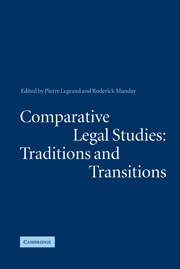Book contents
- Frontmatter
- Contents
- List of contributors
- Introduction
- Comparative legal studies and its legacies
- Comparative legal studies and its boundaries
- Comparative legal studies and its theories
- Comparative legal studies and its futures
- 12 Comparatists and transferability
- 13 Comparatists and extraordinary places
- Conclusion
- Index
12 - Comparatists and transferability
Published online by Cambridge University Press: 18 December 2009
- Frontmatter
- Contents
- List of contributors
- Introduction
- Comparative legal studies and its legacies
- Comparative legal studies and its boundaries
- Comparative legal studies and its theories
- Comparative legal studies and its futures
- 12 Comparatists and transferability
- 13 Comparatists and extraordinary places
- Conclusion
- Index
Summary
Introduction
Law is on the move. Social engineering through law, for all that it is somewhat out of fashion ‘at home’ in many industrially developed societies, is increasingly practised abroad. The range of societies currently caught up in what many still describe as ‘legal transplants’, but which I shall be calling ‘legal transfers’, is not confined to those in the developing world, though even this covers places as different as China, south-east Asia or Latin America. It also includes almost all of the ex-communist countries and, in many respects, even the countries seeking to harmonize their laws within the European Union. Indeed, the developments associated with the globalization of markets and communication mean that few, if any, places are now immune. If the ‘law-and-development’ movement is thus in its second (some say third) wave, the question has been raised of how to avoid repeating the ‘mistakes’ made the first time round. A selective overview of some of the debates concerning the possibility and appropriateness of legal transfers may perhaps make a contribution to this task.
Three sets of interrelated issues will need be considered. How far is it possible to understand other peoples' law? What can be done to ensure that only that law is transferred which ‘fits’ into its new setting? Finally, in what ways are current wider political, economic and social developments affecting processes of legal transfer?
- Type
- Chapter
- Information
- Comparative Legal Studies: Traditions and Transitions , pp. 437 - 466Publisher: Cambridge University PressPrint publication year: 2003
- 20
- Cited by



